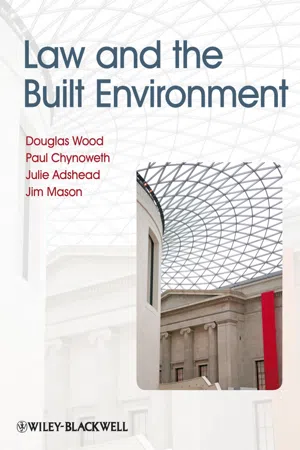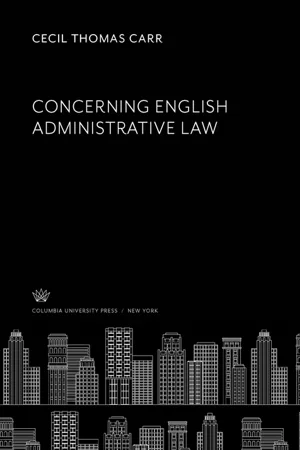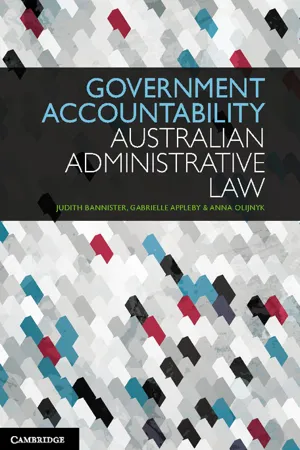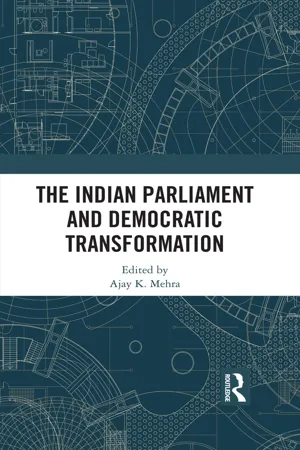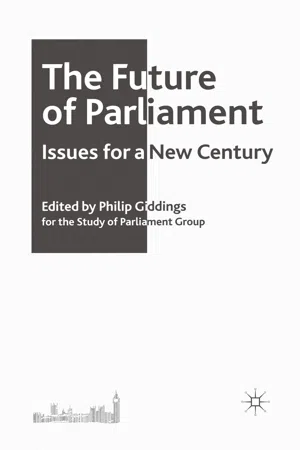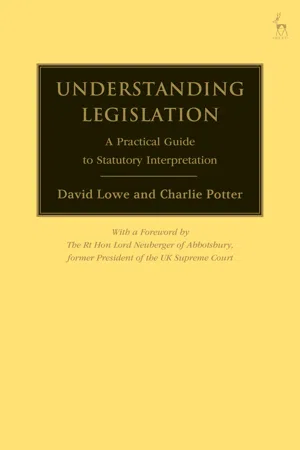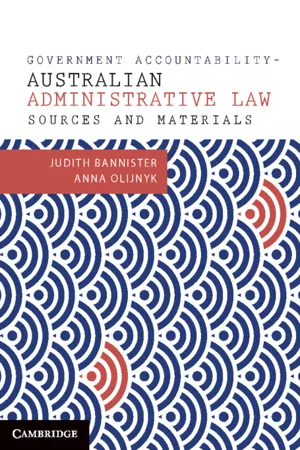Law
Delegated Legislation
Delegated legislation refers to the process by which a legislative body delegates its lawmaking authority to another entity, such as a government agency or local authority. This allows for the creation of detailed rules and regulations to supplement the broader framework of primary legislation. Delegated legislation is often used to address technical or administrative matters, providing flexibility and efficiency in the lawmaking process.
Written by Perlego with AI-assistance
Related key terms
1 of 5
12 Key excerpts on "Delegated Legislation"
- eBook - ePub
- Andrew Mitchell(Author)
- 2008(Publication Date)
- Routledge-Cavendish(Publisher)
2 Delegated Legislation This topic enables you:- To appreciate that primary legislation is often supplemented by different types of secondary, technical legislation.
- To show the extent of legislation that may be passed.
- To indicate that legislation can be made by a range of bodies and organisations under authority from primary legislation.
- To appreciate the scale of law-making that occurs in the English legal system.
- To understand the relationship between the creation of secondary legislation and constitutional legal theory.
By volume, secondary, or delegated, legislation is the largest source of legislation in the English legal system. In 1998, there were 3,319 pieces of UK Delegated Legislation compared with only 49 pieces of primary legislation. In 2001, the peak year for Delegated Legislation between 1950 and the present, there were some 4,147 pieces of UK Delegated Legislation and, by contrast, only 25 Acts of Parliament! By 2006, the Delegated Legislation figure had settled at around 3,500. So what is this mass of legislation concerned with? Who reads it all? Is it all ‘good law’?WHAT IS Delegated Legislation?
The word ‘delegate’ means to pass power to another person. Delegated Legislation is therefore formed when Parliament has delegated power to other persons or bodies. The authority to make these laws is laid down in primary legislation (Acts of Parliament). Consider the example set out in Developing the subject 2.1.On a simple level, therefore, it can be said that the Equality Act (Sexual Orientation) Regulations 2007 is the offspring of the main primary legislation, the Equality Act 2006. For this reason, the 2006 Act might be referred to as the ‘Parent Act’. Alternatively, such primary legislation can be called an Enabling Act - Ian McLeod(Author)
- 2009(Publication Date)
- Hart Publishing(Publisher)
10 Subordinate Legislation Introduction The fact that Acts of Parliament, as primary legislation, frequently delegate to various people and bodies the power to make secondary legislation, is a purely practical consequence of the volume of detailed legislation which complex, modern states require, but which would overburden the standard parliamentary process. There is no limit to the people and bodies who can be given power to make secondary legislation but the most common examples are secretaries of state and local authorities. For the obvious reason, such leg-islation is often called ‘Delegated Legislation’ but the terms ‘subordinate legis-lation’ and ‘secondary legislation’ are both often used as alternatives, with all three terms carrying the essential point that any legislation which depends for its validity on some other legislation cannot be primary. Nothing turns on which term is used but subordinate legislation is the pre-ferred usage of parliamentary counsel and it is the only one which appears in the Interpretation Act 1978, section 21(1) of which provides: In this Act . . . ‘subordinate legislation’ means Orders in Council, orders, rules, reg-ulations, schemes, warrants, byelaws and other instruments made or to be made under any Act. Although academic commentators on public law tend to speak of Delegated Legislation, the specialised focus of this book makes it appropriate to follow the style of parliamentary counsel. While any kind of statute can create a power to make subordinate legisla-tion, those that are most likely to do so deal with broad areas of law within which significant amounts of detail are required in order to make relatively broad principles workable. Typical examples include topics such as develop-ment control and environmental protection, education, employment, finan-cial services regulation and highways.- eBook - PDF
- Douglas Wood, Paul Chynoweth, Julie Adshead, Jim Mason(Authors)
- 2021(Publication Date)
- Wiley-Blackwell(Publisher)
Much of the law relating to building matters and the transfer of land is to be found in this form. Examples include building regulations, and many aspects of planning law and health and safety legislation. Delegated The Administration of Law 13 legislation is made by ministerial orders known as statutory instruments, which since 1946 have had to be published or ‘ laid ’ before Parliament before they become effective. A statutory instrument can be recognised in that instead of having the word Act at the end of the name of the instrument (document), the order, rules or regulations will be cited (recorded) by reference to year and number with the letters SI indicating its status, e.g. The Home Improvement (Number 2) Regulations, 2007 (SI 2007/1667). Two other forms of Delegated Legislation are by-laws and the regulations of professional bodies and trade unions. By-laws are local laws which regulate aspects of life. So-called autonomic legislation regulates the conduct of the members of professional associations such as the Royal Institution of Chartered Surveyors and The Royal Institute of British Architects, and provides for sanctions where appropriate. (D) Control of Delegated Legislation Control over Delegated Legislation is exercised by Parliament and the courts. (a) Parliament Committees of the House of Commons review statutory instruments and decide which of them should be brought to the attention of Parliament. The enabling Act (the individual Act which grants power to make particular regulations) sometimes itself requires that the instrument be brought to the notice of Parliament. Appropriate government ministers are answerable to Parliament in respect of regulations made by their own departments, while by-laws must be con fi rmed by a government department before they become law. Parliament also has the overall safeguard in that it may withdraw the delegated power if it so wishes. - eBook - PDF
- Cecil Thomas Carr(Author)
- 2019(Publication Date)
- Columbia University Press(Publisher)
38 Delegated Legislation considerable part of what is now left to delegated legis-lation. If members of the British public ever thought about delegation, there is no reason to suppose that their view would be hostile. Corporate and municipal bodies have been making by-laws from time immemorial. Popular opinion is ready to respect laws made by any well-known authority. Is it too trivial to look for an analogy in the regulation of the country's peace-time diversions—the cricket, which is a national game in England; the golf, which is an imported counter-irritant; and the card-playing, which, as Dr. Johnson said, generates kindness and consolidates society? The English have accepted the rules, without which these pastimes cannot be enjoyed, from the Marylebone Cricket Club at Lord's, the Royal and Ancient Society at St. Andrews, and the Portland Club in London. They do not know the actual legislators by sight or by name, but they have been content with their laws. The Committee on Ministers' Powers qualified its tolerance of Delegated Legislation by specifying four ex-ceptional types which would require special vigilance. May I say a few words on these? They seem so inevitable and indispensable that one may expect to detect them 011 both sides of the Atlantic. As the first of the four the committee named the power to legislate on matters of principle or even to impose taxation. In theory, of course, the legislature ought to « Another type of exceptional delegation mentioned by the committee (delegation conferring so wide a discretion that it is impossible to know Delegated Legislation 39 settle the principles and delegate the details, but oc-casionally the legislature shirks its duty. In 1925 a big consolidation of Acts relating to the Supreme Court in England was waiting upon the passing of a preliminary amending Bill. This amending Bill was delayed by in-ability to settle the question how far juries should be dispensed with in civil trials. - eBook - PDF
Government Accountability
Australian Administrative Law
- Judith Bannister, Gabrielle Appleby, Anna Olijnyk, Joanna Howe(Authors)
- 2014(Publication Date)
- Cambridge University Press(Publisher)
18 Meyerson, above n 17, 53. 19 Jeremy Waldron, Law and Disagreement (Clarendon Press, 1999) 60. 112 ADMINISTRATIVE DECISION-MAKING fees pursuant to a contractual condition, rather than a legislative instrument. These, as a general rule, remain entirely hidden from public sight and outside of the oversight of parliament. 20 Thus, while the innovations to ensure proper oversight and transparency for Delegated Legislation are important, they still fall short of providing accountability for the myriad of regulation to which individuals within Australia are subject. The need for Delegated Legislation Despite these concerns, Delegated Legislation has been ubiquitous for decades, even centuries. While perhaps not recognising the need for the sweeping delegations that were given to Henry VIII, parliaments readily accept that they need to delegate some powers. Justifications for delegation of legislative power are usually practical. Broadly speaking, parliament delegates legislative power to the executive where: technical details need to be provided by experts to policies contained in primary legislation; legislative detail requires frequent amendment – for example, to keep up with changes in industry; the complexity of legislative detail would clutter the primary legislation and reduce its clarity; legislative detail must be enacted expeditiously during times of emergency; and, finally, delegation is used when parliament does not have the time to consider and pass the legislative detail itself. Viewed in this way, delegation of legislative power ought to be the process of adding flesh to the bones of a legislative framework determined by parliament. There should be little discretion in the executive to use its delegated power to make important policy determinations. - eBook - PDF
Legislation in Europe
A Country by Country Guide
- Ulrich Karpen, Helen Xanthaki, Ulrich Karpen, Helen Xanthaki(Authors)
- 2020(Publication Date)
- Hart Publishing(Publisher)
They are passed by a majority and can be amended or repealed by subsequent primary legislation. There is a limited exception to the rule that only primary legislation can override primary legislation – the use of a Henry VIII clause. This is a transfer of power to amend or repeal primary legislation via delegated legis-lation on the basis of an enabling clause within a primary Act. Types of Delegated Legislation are UK Statutory Instruments (SIs), Welsh SI, Scottish Sis, Orders in Council, Northern Ireland Statutory Rules, Church Instruments, UK Ministerial Decisions, UK Ministerial Orders, the historical UK Statutory Rules and Orders (1900–48), Northern Ireland Statutory Rules and Orders (1922–73), Orders in Council, Northern Ireland Orders in Council, and Orders made under the Royal Prerogative. Delegated legisla-tion requires the express transfer of legislative power to the executive by means of a concrete and precise enabling clause in primary legislation. Although it is a legitimate constitutional anomaly, in that it allows the executive to legislate in contrast with the principle of separa-tion of powers, it is quite popular due to its faster and easier adoption process, and ease of amendment. 31.3. Competences, Organisation and Process of Legislation (Procedures) The passage of legislation through Parliament, referred to as the legislative process, is one phase of the wider policy process, as shown in Figure 31.1 below. As in most jurisdictions, the UK has specific procedures which detail how a bill (a proposed law introduced in Parliament) becomes an Act of Parliament (a law). For each parliamentary session, the government has a parliamentary programme which has been agreed before the session starts and details the bills which the government intends to bring to Parliament during that session. This programme is usually agreed at Cabinet level and is sometimes referred to as the ‘prioritisation’ of legislation. - Ajay K. Mehra(Author)
- 2017(Publication Date)
- Routledge India(Publisher)
9 If juridical control on Delegated Legislation is labelled as being relatively weak, then it is important to check out whether the ostensible parliamentary checks on Delegated Legislation are more binding.Parliamentary control of Delegated Legislation
Parliamentary control over Delegated Legislation is exercised in many ways.10 For one, when a Bill that involves proposals for delegation of legislative powers is tabled in Parliament, rules of procedure11 require that the Bill be accompanied with a memorandum, which explains the proposal, draws attention to the scope of the legislation and states whether the legislation is exceptional or normal.12 Presumably the purpose of the memorandum is to focus the attention of legislators on the provisions of the Bill relating to Delegated Legislation. The second stage of control flows from the fact that the executive is expected to frame the rules within a period of six months of the parent legislation having been passed and following it by the publication of the rules in the Gazette of India to draw public attention to the rules. The third control of Delegated Legislation is the laying requirement before Parliament – it is required that all Delegated Legislations including Rules, Regulations, Notifications, Orders, Bye-laws and Schemes should be placed on the Table of both Houses of Parliament.13 The period over which the Delegated Legislation remains tabled is specified in the relevant parent statue and has to be completed before both the Houses are adjourned sine die and later prorogued. If this specification is not met, then the Delegated Legislation needs to be re-laid in the succeeding session until the period is completed in one session. Apparently there is no general obligation to lay Delegated Legislation before the Houses of Parliament; rather the terms of the delegated statue determine whether the rules are to be laid before the legislature. In fact in the 1950s and 1960s most laws did not require the laying of Delegated Legislation before Parliament – it was only in 1971 that the Committee on Subordinate Legislation of both Lok Sabha and Rajya Sabha suggested a ‘laying formula’ for incorporation in all Bills so that all Delegated Legislation ended up being tabled before Parliament. Once the Delegated Legislation is tabled in Parliament, legislative members can modify or annul the Delegated Legislation through a motion. The fourth source of parliamentary control over Delegated Legislation comes from the aforementioned Committees – the Lok Sabha Committee on Subordinate Legislation (established in 1953) and its counterpart in the Rajya Sabha (established in 1964).14- eBook - PDF
The Future of Parliament
Issues for a New Century
- P. Giddings(Author)
- 2005(Publication Date)
- Palgrave Macmillan(Publisher)
In 1975, the Renton Committee proposed that, ‘Only details [of legislation] which may require comparatively frequent modification should be delegated’, 4 whereas 20 years later the Hansard Society Commission on Making the Law recommended that, in order to focus Parliament’s limited legisla- tive time on key issues of principle, ‘most detail should be left to dele- gated legislation’. But they added the vital proviso that this should only happen if: ‘much more satisfactory procedures are adopted by par- liament for the scrutiny of Delegated Legislation’. 5 Most examinations of the issue have come to the conclusion that, so far as delegated legis- lation is concerned, the right balance has not yet been struck between efficiency and accountability. Most SIs are considered by the JCSI to determine whether they are intra vires the powers given to Ministers under the parent act and whether they are unclear or defectively drafted. This Committee has no power to consider the ‘merits’ of an instrument. Although in principle no instrument should be passed by either house before the JCSI has completed its scrutiny, this convention is regularly ignored in the Commons. Concern over the quality of parliamentary scrutiny of SIs has been intensified by the perception that some acts of Parliament are being passed as ‘framework legislation’, where the details which remain to be filled in by orders and regulations are the substantive portion of the operative part of the legislation. The House of Lords responded to these concerns by establishing, in 1992, its Delegated Powers Committee. The Committee’s terms of reference were – … to report whether the provisions of any bill inappropriately delegate legislative power, or whether they subject the exercise of legislative power to an inappropriate level of parliamentary scrutiny. 138 The Future of Parliament - eBook - PDF
Understanding Legislation
A Practical Guide to Statutory Interpretation
- David Lowe, Charlie Potter(Authors)
- 2018(Publication Date)
- Hart Publishing(Publisher)
The interaction between different pieces of legislation, including by way of amend-ment, repeal and consolidation, are discussed in detail in Chapter 5. Subordinate Legislation: Statutory Instruments 31 1.19 All legislation applying in the UK must be made either by Act of Parlia-ment or pursuant to authority granted by an Act of Parliament. 32 In practice, the vast majority of legislative instruments enacted are not primary legislation in the form of Acts of Parliament, but are ‘subordinate’ 33 or ‘secondary’ or ‘delegated’ legislation, so called because they are made (ultimately) under powers granted by a statute (known as an enabling, empowering or ‘parent’ Act of Parliament). 1.20 The nature of subordinate legislation means that, unlike an Act of the sov-ereign Parliament, it can be invalid or ultra vires where its substance goes beyond 9 Subordinate Legislation: Statutory Instruments 34 Public Law Project v Lord Chancellor [2016] UKSC 39, [2016] AC 1531 [23] (Lord Neuberger): ‘Subordinate legislation will be held by a court to be invalid if it has an effect, or is made for a pur-pose, which is ultra vires, that is, outside the scope of the statutory power pursuant to which it was purportedly made.’ 35 See, eg, Re G (Adoption: Unmarried Couple) [2008] UKHL 38, [2009] 1 AC 173 [3] (Lord Hoffmann), [46] (Lord Hope); and see further the discussion at Chapter 10.25, especially at n 61 to that paragraph. 36 But note that it is presumed that any requisite steps were taken and that legislation is valid, unless and until the contrary is proven: see Chapter 4.68–4.70. 37 It has been said that the term ‘statutory instrument’ is not, technically speaking, a kind of Delegated Legislation, but rather a formal method of making such legislation (by virtue of the Statutory Instruments Act 1946): see Greenberg, Craies on Legislation (2016) (n 15), para 3.1.4, 123–24. - eBook - ePub
- Ryan Murphy, Frances Burton(Authors)
- 2020(Publication Date)
- Routledge(Publisher)
Both primary and secondary legislation are subject to control and scrutiny from Parliament and others. This is particularly important for Delegated Legislation as, without the involvement of Parliament, there is a risk that the democratic link to the people is lost. This would undermine the legitimacy of legislation. The rest of this section will explore not only the way in which scrutiny happens but also the effectiveness of those scrutiny mechanisms. It should be noted from the outset that statutory instruments – the major form of Delegated Legislation – find their basis in an Act of Parliament. Thus, Parliament has made an active choice to provide for such delegation and the creation and control of those powers are in the hands of Parliament. Those granted powers under such an Act cannot go further than the Act permits. As such, a well-drafted Parent Act can go a long way to reducing the risk of abuse. Committees of Parliament As well as the formal process required for the passage of secondary legislation, there is also additional scrutiny by a system of committees in Parliament. These provide a more detailed process of scrutiny than is possible in the limited time available in the Main Chamber of the Commons or Lords. There are numerous committees that undertake different tasks in relation to scrutinising pieces of Delegated Legislation. The purpose of these committees is to provide a complete system of scrutiny that is based on the distinct separation of functions between the legislature and the executive. In this way, Parliament is able to act as a check on the powers of the Government. The remainder of this section will explore the major parliamentary committees that are involved in scrutinising the use of Delegated Legislation - eBook - PDF
Studies in Economics and Political Science
13 Volume Set
- Various(Author)
- 2022(Publication Date)
- Routledge(Publisher)
This seems to be entirely a result of Departmental tradition. As the Group said in a commentary on its submission to the Pro- cedure Committee, 'at present it is often puzzling why some statutes contain remorseless detail and others simply give power to the Minister to make Statutory Instruments. These were once viewed as a threat to all our liberties. Without taking the matter lightly, one can at least recognize that Delegated Legislation has come to stay, that its application to one field more than another may seem no more than the preference of a particular Ministry or even of a particular draftsman, and that what is really required is more effective Parliamentary scrutiny of what happens once legislation becomes administration... .' 9 Departmental evidence submitted to the Davies Committee on Delegated Legislation in 1953 emphasized the degree of autonomy enjoyed by Departments in determining the extent of delegated powers to be included in Bills. The primary decision lies with the Division of the Department which is responsible for the main heads of the Bill, with the advice of the Treasury Solicitor and Parliamentary Counsel, the latter occasionally having comments or advice to offer about proposals for enabling clauses in the light of his experience with comparable Bills. The Ministry of Health, for example, was quite explicit: *... it is, of course, Ministers who decide what regulation-making power should be included in a Bill and what pro- cedure should apply to any such power', 10 and it is obvious that Cabinet committee control over the details of the substantive clauses of a Bill is much more effective than over the decision as to what is to be put into a Bill and what is to be left to subordinate legislation. - eBook - PDF
Government Accountability Sources and Materials
Australian Administrative Law
- Judith Bannister, Anna Olijnyk(Authors)
- 2018(Publication Date)
- Cambridge University Press(Publisher)
If it were thought that legislative power were being inappropriately delegated, consideration might be given to the adequacy of these safeguards, and perhaps to whether the safeguards are ever inappropriately avoided. For example, some statutes exempt legislative instruments from the disallowance or sunsetting provisions in the Legislative Instruments Act 2003 (Cth). [17.53] Further measures designed to limit inappropriate delegations of legislative power were suggested by PIAC [Public Interest Advocacy Centre], which described parliamentary scrutiny of Delegated Legislation as, in practice, minimal. For example, it recommended that the Regulations and Ordinances Committee should have a stronger role and that legislative instruments be subject to judicial review under the Administrative Decisions (Judicial Review) Act 1977 (Cth). It also suggested that the Legislative Instruments Act be amended to include a non-exhaustive list of powers and matters which should not be delegated, unless there is a public interest in doing so. Conclusion [17.54] Although delegating legislative power to the executive is necessary for an efficient and effective government, some laws are more properly made by Parliament—for example, laws that have a significant impact on individual rights and laws creating serious criminal offences. Given the quantity of delegated law in Australia, robust safeguards and ongoing scrutiny appear to be suitable ways to limit inappropriate delegations of legislative power. Distinguishing acts of legislative and administrative character R G Capital Radio Ltd v Australian Broadcasting Authority (2001) 113 FCR 185 Broadcasting Services Act 1992 (Cth) [As at relevant date] [Some citations omitted]
Index pages curate the most relevant extracts from our library of academic textbooks. They’ve been created using an in-house natural language model (NLM), each adding context and meaning to key research topics.


